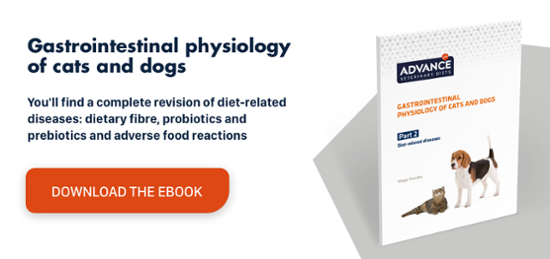Gastroenteritis in dogs: treatment of irritable bowel syndrome
Gastroenteritis in dogs is inflammation of the gastrointestinal tract and may be caused by a bacterial, viral or parasitic infection, as well as the action of certain medications or even a change in diet. It is one of the most significant risk factors for the onset of irritable bowel syndrome, as noted in a study conducted at McMaster University1.
Irritable bowel syndrome (IBS) is a poorly studied condition in veterinary medicine, but it is estimated to affect 5–17% of dogs and causes signs associated with the large intestine, as described by Bercik et al.2 Middle-aged dogs tend to present IBS more than other age groups.

Signs of irritable bowel syndrome in dogs
The most common clinical sign of irritable bowel syndrome in dogs is diarrhoea. Stools may be soft or watery, and often contain mucus. Haematochezia is not common.
Patients frequently suffer weight loss, and recurrent or persistent vomiting may develop. Sometimes complications such as ascites may occur, if there is hypoalbuminaemia, or pale mucous membranes, in the case of chronic gastrointestinal haemorrhage.
As with other disorders of the large intestine, the clinical picture can present with tenesmus, generating pain and/or discomfort. It may also be accompanied by bowel sounds and flatulence. Abdominal pain during episodes may be due to bowel spasms or intestinal bloating caused by gases from aerophagia.
Aetiopathogenesis of irritable bowel syndrome
In approximately 75% of cases, the cause of intestinal inflammation is unclear, as indicated by Sturgess3, although it is thought that it may be associated with a loss of tolerance to luminal antigens, whether from food and/or bacteria.
In fact, a change in diet can trigger irritable bowel syndrome even before the food reaches the colon, which suggests that certain gastrointestinal hormones, such as cholecystokinin and gastrin, play an important role in this condition.
Irritable bowel syndrome is also linked to stress. Animals with a nervous predisposition or which experience stressful conditions, such as rescue dogs, are more likely to develop IBS.
However, the foundation of irritable bowel syndrome is dysfunctional motility control mechanisms. Researchers at UCLA have suggested that changes in the central nervous system probably overstimulate the central stress circuits, which triggers autonomic and endocrine reactions, such as hypermotility.4
Irritable bowel syndrome: diagnosis
The clinical manifestations of irritable bowel syndrome in dogs are numerous but nonspecific, which is why the diagnosis must be by exclusion after ruling out disorders that cause similar clinical signs, for example, inflammatory bowel disease, food sensitivities, infections, chronic pancreatitis or tumours.
Blood tests are needed to assess markers of protein loss, such as serum pancreatic lipase or serum albumins, which is a common secondary problem in irritable bowel syndrome. A stool test, microbiology culture or the Baermann technique can be used to detect parasites and enteropathogenic bacteria. A dietary assessment should also be performed to rule out any food sensitivities.
Some cases require a colonoscopy with a biopsy of mucosa collected from different areas to rule out inflammatory bowel disease and tumours. It should be noted that endoscopy is less invasive but offers fewer sampling possibilities.

Irritable bowel syndrome: treatment
Treatment usually includes changes to the diet and the inclusion of fibre supplements, as well as the intermittent use of antidiarrhoeal and anticholinergic agents. In some cases, increasing the amount of fibre in the diet may improve symptoms, but it is important to bear in mind that too much fermentable fibre can stimulate gas.
Some patients, especially those with diarrhoea triggered by certain foods, only respond well after a dietary change, particularly after withdrawing ingredients based on hydrolysed proteins. This is suggestive of a food sensitivity, which is why certain diets with very digestible ingredients such as Advance Gastroenteric can help reduce gastrointestinal disorders.
Drug therapy includes the use of opiates, such as loperamide, mainly during episodes of diarrhoea. Anticholinergics, such as hyoscine, may relieve intestinal spasms, but often exacerbate ileus. Dogs with abdominal pain can be given a mixture of antispasmodics and tranquillisers. The sedative action of chlordiazepoxide and the anticholinergic effect of clidinium bromide can also be combined to relieve discomfort caused by the increased motor function of the colon.
